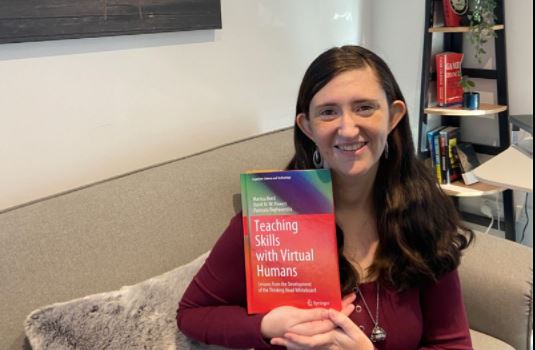
The long-running ARC and NHMRC-funded ‘Thinking Head’ artificial intelligence research program at Flinders University has inspired much further learning, not least the recently published Cognitive Science and Technology reference book.
Dr Marissa Bond, who finished her PhD in computer science with College of Science and Engineering supervisor Professor David Powers in 2017, has just published her research with Springer, entitled Teaching Skills with Virtual Humans, with coauthors Professor Powers and Associate Professor Pammi Raghavendra, from the Flinders College of Nursing and Health Sciences.
Why Use Virtual Tutors, Introduction, The Future of Virtual Teachers, Creating Engaging Embodied Conversation Agents, Evaluating the Social Tutor, Existing Software Tutors, Designing for Specific Populations, Designing Effective Teachers, Implementing a social Tutor for Autism, The Thinking Head Whiteboard and information in the new book’s chapters link Dr Bond’s study on developing and evaluating virtual tutoring software to support children with autism to improve their social skills.
“This is the work that the book is based on and is used as a case study throughout,” she says
Dr Marissa Bond (nee Milne), who worked in STEM outreach and education at Flinders University during her PhD studies, is also a trained primary school teacher. Her PhD was co-supervised by Associate Professor Raghavendra and Dr Richard Leibbrandt, who with Professor Powers was part of the Thinking/Teaching Head project.
She tutored at Flinders for several years before moving into science communication and student recruitment at Flinders for seven years and also spent time as a software engineer at Clevertar, an advanced AI software developer based in Adelaide that spun out from Flinders University experts including founders Dr Martin Luerssen and Dr Trent Lewis (both part of the original Thinking Head project).
Dr Bond, now Head of Education Technology at Lumination in Adelaide, looks after the software development team and the education team.
“The PhD was a great introduction to my current role, which focuses on developing extended reality (VR/AR) technologies and other future technologies (robotics/drones) – developing bespoke applications for clients, and supporting students and teachers to use these technologies effectively in the classroom, even creating their own immersive experiences,” she says.
“We have just released our first in-house app LeadMe Edu to help teachers manage and effectively use class sets of Android devices (such as those used in handheld VR headsets), we have ongoing projects with the Department for Education SA, Catholic Education SA, Department of Education NSW and others, and we also work directly with a wide range of local schools, where we run excursion and incursion programs, remote learning, and teacher professional development events.”
See the chapter reference: Bond M, Powers DMW and Raghavendra P (2021) Evaluating the Social Tutor. In: Teaching Skills with Virtual Humans. Cognitive Science and Technology. Springer, Singapore. https://doi.org/10.1007/978-981-16-2312-7_9

